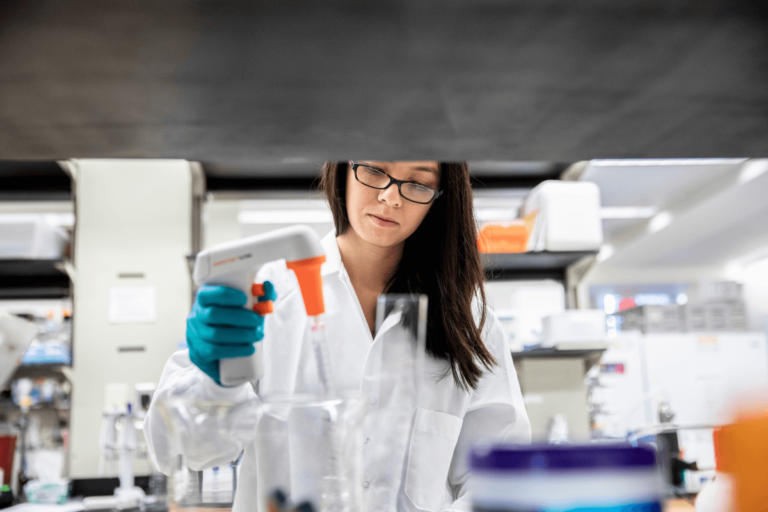
The world needs more chemical and biomolecular engineers.
According to Professor Peter Goodhew CBE FREng, a Member of the Royal Academy of Engineering (RAE) Board of Trustees, engineers play a pivotal role in driving economic and social development.
“And they continue to do so by designing and delivering safe systems that facilitate education and healthcare, enhance the quality of life and safeguard critical infrastructure,” he said in “The Global Engineering Capability Review,” a study commissioned by the Lloyd’s Register Foundation and the Royal Academy of Engineering.
Biomolecular engineers combine knowledge in molecular biology, biophysical chemistry and chemical engineering to develop everything from pharmaceutical drugs to foods.
Chemical engineers help advance healthcare, including technology and medicine. They develop processing systems that more efficiently manage waste disposal.
In a world dealing with a pandemic and climate crisis, these professions have never been more relevant.
Join these in-demand professions with a degree from these universities that effectively combine theoretical knowledge with extensive practical learning to excel in the workforce:
DEPARTMENT OF CHEMICAL AND BIOMOLECULAR ENGINEERING – THE UNIVERSITY OF ILLINOIS AT URBANA-CHAMPAIGN
The University of Illinois at Urbana-Champaign’s Department of Chemical and Biomolecular Engineering tackles the world’s most daunting challenges in health, energy, and the environment.

Source: The University of Illinois – Urbana Champaign
As a PhD student at the University of Illinois, expect to get involved in dynamic and impactful research in the department’s research areas: Biomolecular Engineering, Energy and Sustainability, Soft Matter and Advanced Materials, Computational Research. There are many exciting projects for graduate students at the leading edge of engineering research, from implantable biomaterials for tendon regeneration, nanomaterials for energy use, to greener alternatives for chemical processes.
The Department works closely with corporate partners, national labs, and other universities.
Industry connections include the Center for Advanced Bioenergy and Bioproducts Innovation (CABBI), the National Center for Supercomputing Applications (NCSA) and the Beckman Institute for Advanced Science and Technology. These collaborations ensure a smooth transition from university to your chosen career path, whether you want to work in academia or industry.
The University’s campus is also home to the University of Illinois Research Park, where companies like Abbott, Corteva, AbbVie, Yahoo!, Caterpillar, and Wolfram have established offices.
Highly motivated graduate students, even those from non-ChemE backgrounds, are welcome to apply. The University is committed to diversity and a supportive environment. Several programmes are available to provide mentoring, professional development opportunities and more to doctoral students from underrepresented communities.
Applications for 2020/21 are now open. Click here to get started.
DEPARTMENT OF CHEMICAL AND BIOMOLECULAR ENGINEERING – JOHNS HOPKINS UNIVERSITY
The Department of Chemical and Biomolecular Engineering at Johns Hopkins University strives to be a leader in research and education.

Source: Johns Hopkins University
Their PhD programme inspires students to solve some of the world’s most challenging problems, from the development of new therapies to conquering cancer and creating earth-friendly biofuels.
Candidates must complete six graduate-level courses, including these four core courses: Advanced Transport Phenomena, Metabolic Systems Biotechnology, Interfacial Science with Applications to Nanoscale Systems and Thermodynamics, Statistical Mechanics, and Kinetics.
All Johns Hopkins graduate students will have the opportunity to learn from and work with faculty — 19 full-time members and 13 affiliated faculty and research scientists — who are respected leaders and innovators in their fields.
The Department is home to 24 postdoctoral fellows, 111 Ph.D. students, 116 MSE students and 343 BS students. Join them as the PhD cohort for 2020/21 — click here to find out more.
DEPARTMENT OF CHEMICAL AND BIOLOGICAL ENGINEERING – COLORADO SCHOOL OF MINES
Graduate degree programmes at Colorado School of Mines (Mines) provide you with the knowledge, technical skills and problem-solving skills to navigate an increasingly complex world.

Source: Colorado School of Mines
Each graduate programme offers a unique mix of interdisciplinary opportunities and flexible curricula for you to tailor your degree to your specific interests and goals, inevitably steering you into a future leadership role. At Mines, you can choose from extremely diverse programs in renewable energy, materials science, transport processes, theoretical and applied thermodynamics, computational methods and atomistic simulation.
For the PhD in Chemical Engineering, you’ll complete a variety of core courses such as Applied Mathematics In Chemical Engineering, Advanced Chemical Engineering Thermodynamics, Transport Phenomena and Reaction Kinetics and Catalysis.
Mines prioritises the personal relationship that develops between the faculty and students pursuing advanced degrees. With 19 tenure-track faculty and approximately 60 full-time graduate students, this ensures a student-to-faculty ratio that facilitates the development of strong mentoring and peer relationships.
Each graduate programme is also complete with engaging student activities that instill leadership skills. Other arts on campus initiatives ensure you enjoy your US study experience.
SCHOOL OF CHEMICAL, BIOLOGICAL, AND ENVIRONMENTAL ENGINEERING – OREGON STATE UNIVERSITY
The public research university in Corvallis, Oregon offers a selection of transformative graduate courses — all of which are tailored to individual academic needs and professional goals.

Source: Oregon State University
A diversity of faculty interests and collaboration between the school and other engineering departments and schools and research centres on campus make this possible. At Oregon State University, you will work with talent from all 50 US states and more than 100 countries too.
For the PhD in Chemical Engineering, you can study about Biochemical Reactors, Biotechnology, Electrochemical Deposition, Micro Energy and Chemical Systems, Thin Film Processing, Waste Minimisation, and more.
The School also offers graduate curricula leading to the Master of Engineering, Master of Science, and Doctor of Philosophy degrees in Environmental Engineering. These programmes apply mathematical and scientific principles to the design, development and operational evaluation of systems for controlling contained living environments and for monitoring and controlling factors in the external natural environment
To learn more about Oregon State’s course offerings, click here.
*Some of the institutions featured in this article are commercial partners of Study International
Like this? Then you’ll love…
She Loves Data: Workshops that inspire women to find their voice in technology
Create solutions to environmental challenges with a postgraduate degree in sustainability







